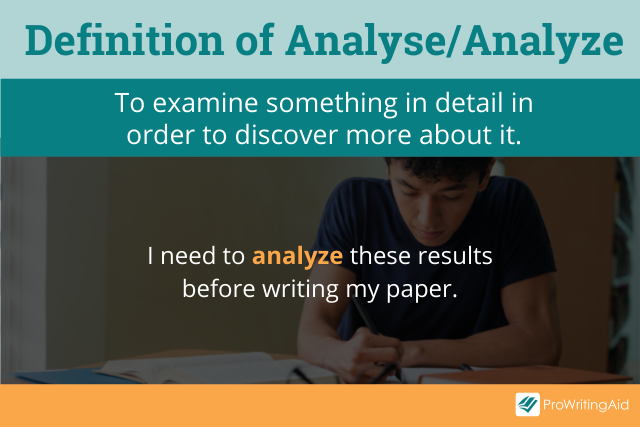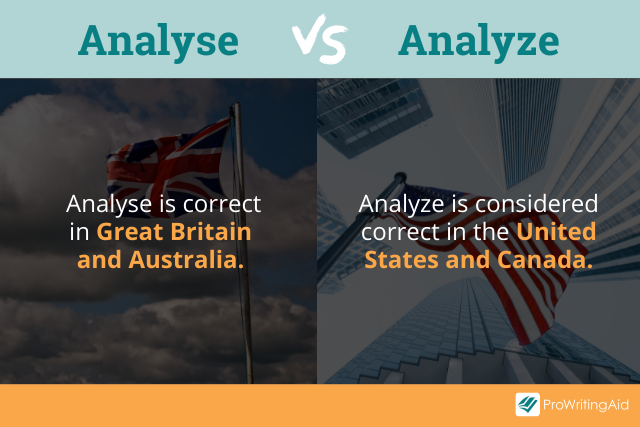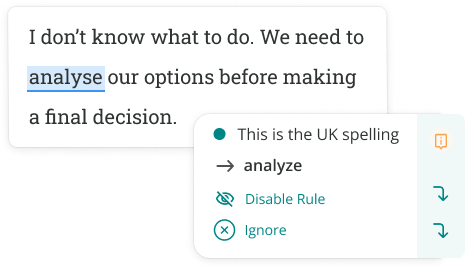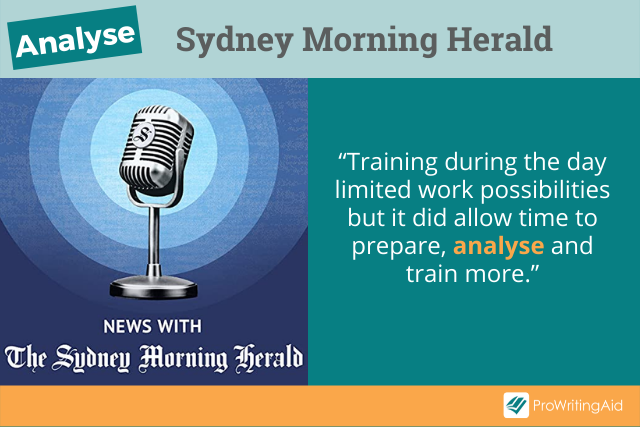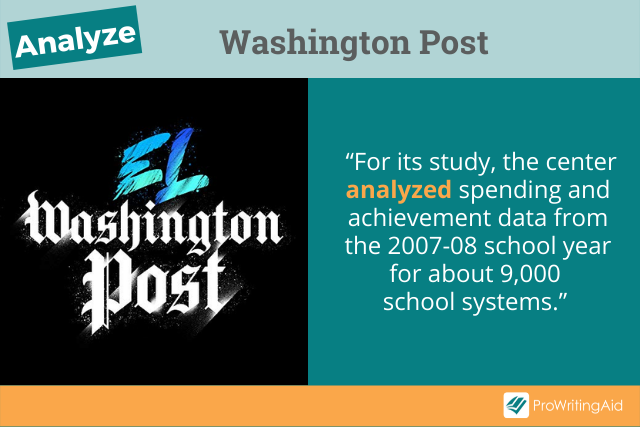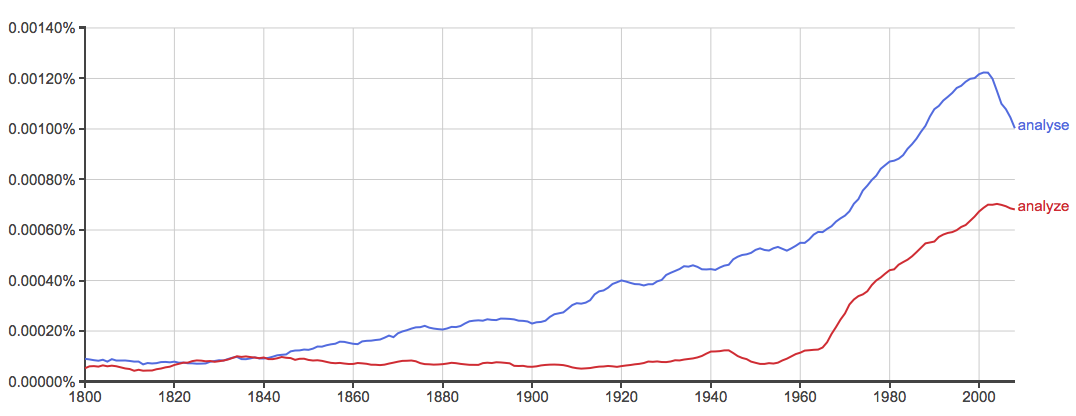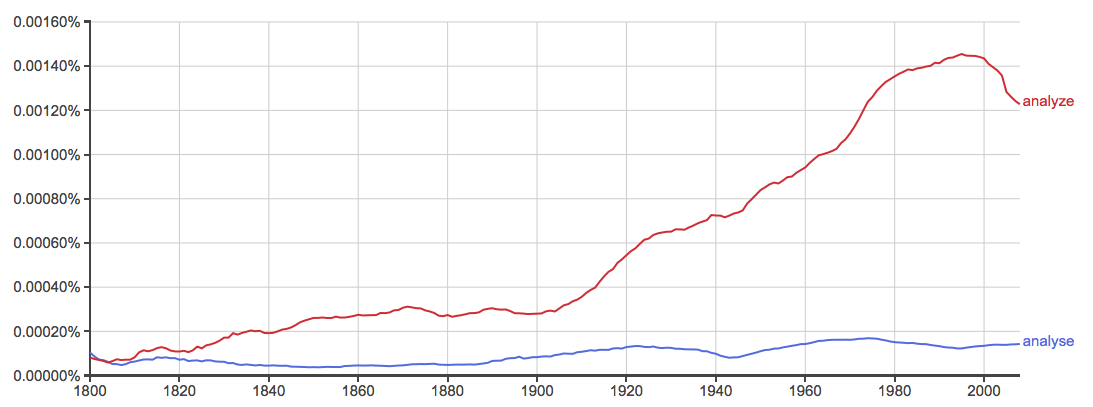There’s a lot of confusion around when to use analyse and analyze, since they’re two commonly accepted spellings of the same word.
So when should you use each variant?
The short answer is that it depends on whether you’re writing for a British audience or an American audience. Analyze is standard in American English, while analyse is standard in British English.
In this article, we’ll teach you the difference between analyse and analyze and show you when to use each word.
How to Spell Analyze (in American English and British English)
Analyze and analyse are two forms of the same verb. Their definition is “to examine something in detail, in order to discover more about it.»
You can use both analyze and analyse in the same sentences. Changing the spelling doesn’t change the meaning of the word.
The corresponding noun for both variants of this verb is “analysis.”
For example, you might use the verbs analyze or analyse to describe the act of conducting a scientific or grammatical analysis.
The only difference between the two spellings is the geographical audience you’re writing for.
Analyze is considered correct in areas that speak American English, such as the United States and Canada. If you’re communicating with a primarily American audience, you would write “I analyzed your chemical sample and sent you my report.”
Analyse is considered correct in areas that speak British English, such as Great Britain, India, and Australia. If you’re communicating with an audience in one of these areas, you would write “I analysed your chemical sample and sent you my report.”
TIP: To remember the difference between analyse and analyze, remember that the word “British” includes an S. The word analyse also includes an S, so it’s the preferred spelling in British English.
This tip is applicable to several other words that also follow this same pattern. Here are some more words that are spelled with an S in British English and a Z in American English:
- Catalyse (UK) and catalyze (US)
- Crystallise (UK) and crystallize (US)
- Organise (UK) and organize (US)
- Realise (UK) and realize (US)
To learn more about the differences between British and American English, check out our article on common alternate spellings.
Should You Use Analysing or Analyzing?
The words analysing and analyzing are the present participle forms of the verbs analyse and analyze.
The rules here are the same as the rules for analyze and analyse. Again, all you need to remember is that the version with an S is British English, while the version with a Z is American English.
If you’re writing for an audience that uses a different type of English from your own, you can use set your language choice on ProWritingAid to reflect that.
That way, the tool will tell you when you should be using an alternative spelling from the one you’re used to.
Examples of Analyse and Analyze (in American English and British English)
The best way to intuitively understand the difference between analyze and analyse is by seeing them in action. Let’s look at how news sources in different parts of the world use these two spellings.
Analyse Examples (British Spelling)
Here are some sentences that include the word analyse from British, Indian, and Australian publications, all of which use British English.
“While the actual examination will be of three hours in both the shifts, students will get a ‘cool off’ time of additional 15 minutes in each shift to read and analyse the questions and also to plan the answers accordingly.”—The Times of India
“Scots boffins are set to analyse slithers of a mystery specimen—in order to determine if it’s a potato.”—The Scottish Sun
“Training during the day limited work possibilities but it did allow time to prepare, analyse and train more.”—Sydney Morning Herald
“If an automated system analyses voters’ behaviour at poll booths, how accurate will this system be, what kind of data will be stored, and how will the secrecy of ballots be maintained?”—Medianama
“If consumers today use artificial intelligence to analyse their spending, they can not just save money but also make money by investing at right places.”—Financial Express
“Industry experts analyse the opportunities and the challenges brought about by the surge in VoD services in the Nordic countries.”—Cineuropa
“Before investing in a mutual fund SIP, analyse these 5 factors.”—Economic Times
“After the artificial intelligence algorithms have analysed the video feed, the processed images are eliminated from the system in a ‘matter of milliseconds.’”—RailTech
“She then started to analyse the link between the wearing of sunglasses and the broader phenomenon of ‘what it is to be cool.’”—The Guardian
Analyze Examples (American Spelling)
Here are some sentences that include the word analyze from American and Canadian publications.
“A federal agency failed to adequately analyze the environmental harm that could be caused by increasing the size of a southeastern Montana coal mine that feeds a nearby power plant before approving an expansion permit.”—US News
“Businesses must analyze real-time trends to grasp the breadth of the disability economy.”—Forbes
“As a result of this approach, enterprises and users in over 50 countries have been able to analyze larger volumes of observability data, drastically reduce costs, and enable faster MTTR without the manual toil of traditional platforms.”—NBC
“Using artificial intelligence to analyze vast amounts of data in atomic-scale images, Stanford researchers answered long-standing questions about an emerging type of rechargeable battery posing competition to lithium-ion chemistry.”—Stanford University News
“For its study, the center analyzed spending and achievement data from the 2007-08 school year for about 9,000 school systems.”—Washington Post
“Filmmaker Nanfu Wang, who was in China with her son visiting family for Chinese New Year in January 2020, imbues the scenes with her own pandemic story, as she analyzes how China stage-managed the catastrophe.”—Los Angeles Times
“Analyzing the brain changes that occur in the first stages of juvenile fibromyalgia could help to better understand the pathophysiology of this syndrome, which had not been approached from this perspective to date.”—Medical Xpress
“The latest book by Liliana Naydan, associate professor of English at Penn State Abington, analyzes mainstream literary fiction by authors writing about the United States from the time of the Y2K crisis to the onset of the pandemic.”—Penn State News
“By analyzing data on a player’s in-game behavior, the goal of the position will be to make gaming an increasingly interactive experience.”—Financial Post
Conclusion on Analyse or Analyze / Analysing or Analyzing
As an easy rule of thumb, remember that analyse is used in British English, while analyze is used in American English.
What are some words with multiple spellings that you tend to get mixed up? Let us know in the comments.
Take your writing to the next level:
20 Editing Tips from Professional Writers
Whether you are writing a novel, essay, article, or email, good writing is an essential part of communicating your ideas.
This guide contains the 20 most important writing tips and techniques from a wide range of professional writers.

Also found in: Thesaurus, Medical, Financial, Encyclopedia, Wikipedia.
an·a·lyze
(ăn′ə-līz′)
tr.v. an·a·lyzed, an·a·lyz·ing, an·a·lyz·es
1. To examine methodically by separating into parts and studying their interrelations.
2. Chemistry To make a chemical analysis of.
3. Mathematics To make a mathematical analysis of.
4. To psychoanalyze.
[Perhaps from French analyser, from analyse, analysis, from Greek analusis; see analysis.]
an′a·lyz′a·ble adj.
an′a·ly·za′tion (-lĭ-zā′shən) n.
an′a·lyz′er n.
American Heritage® Dictionary of the English Language, Fifth Edition. Copyright © 2016 by Houghton Mifflin Harcourt Publishing Company. Published by Houghton Mifflin Harcourt Publishing Company. All rights reserved.
an•a•lyze
(ˈæn lˌaɪz)
v.t. -lyzed, -lyz•ing.
1. to separate (a material or abstract entity) into constituent parts or elements; determine the elements or essential features of (opposed to synthesize).
2. to examine critically, so as to bring out the essential elements or give the essence of: to analyze a poem.
3. to examine carefully and in detail so as to identify causes, key factors, possible results, etc.: to analyze a situation.
4. to subject to mathematical, chemical, grammatical, etc., analysis.
[1595–1605; probably back formation from analysis, with -ys- taken as -ize]
an′a•lyz`a•ble, adj.
an`a•lyz`a•bil′i•ty, n.
an`a•ly•za′tion, n.
an′a•lyz`er, n.
Random House Kernerman Webster’s College Dictionary, © 2010 K Dictionaries Ltd. Copyright 2005, 1997, 1991 by Random House, Inc. All rights reserved.
analyze
Past participle: analyzed
Gerund: analyzing
| Imperative |
|---|
| analyze |
| analyze |
| Present |
|---|
| I analyze |
| you analyze |
| he/she/it analyzes |
| we analyze |
| you analyze |
| they analyze |
| Preterite |
|---|
| I analyzed |
| you analyzed |
| he/she/it analyzed |
| we analyzed |
| you analyzed |
| they analyzed |
| Present Continuous |
|---|
| I am analyzing |
| you are analyzing |
| he/she/it is analyzing |
| we are analyzing |
| you are analyzing |
| they are analyzing |
| Present Perfect |
|---|
| I have analyzed |
| you have analyzed |
| he/she/it has analyzed |
| we have analyzed |
| you have analyzed |
| they have analyzed |
| Past Continuous |
|---|
| I was analyzing |
| you were analyzing |
| he/she/it was analyzing |
| we were analyzing |
| you were analyzing |
| they were analyzing |
| Past Perfect |
|---|
| I had analyzed |
| you had analyzed |
| he/she/it had analyzed |
| we had analyzed |
| you had analyzed |
| they had analyzed |
| Future |
|---|
| I will analyze |
| you will analyze |
| he/she/it will analyze |
| we will analyze |
| you will analyze |
| they will analyze |
| Future Perfect |
|---|
| I will have analyzed |
| you will have analyzed |
| he/she/it will have analyzed |
| we will have analyzed |
| you will have analyzed |
| they will have analyzed |
| Future Continuous |
|---|
| I will be analyzing |
| you will be analyzing |
| he/she/it will be analyzing |
| we will be analyzing |
| you will be analyzing |
| they will be analyzing |
| Present Perfect Continuous |
|---|
| I have been analyzing |
| you have been analyzing |
| he/she/it has been analyzing |
| we have been analyzing |
| you have been analyzing |
| they have been analyzing |
| Future Perfect Continuous |
|---|
| I will have been analyzing |
| you will have been analyzing |
| he/she/it will have been analyzing |
| we will have been analyzing |
| you will have been analyzing |
| they will have been analyzing |
| Past Perfect Continuous |
|---|
| I had been analyzing |
| you had been analyzing |
| he/she/it had been analyzing |
| we had been analyzing |
| you had been analyzing |
| they had been analyzing |
| Conditional |
|---|
| I would analyze |
| you would analyze |
| he/she/it would analyze |
| we would analyze |
| you would analyze |
| they would analyze |
| Past Conditional |
|---|
| I would have analyzed |
| you would have analyzed |
| he/she/it would have analyzed |
| we would have analyzed |
| you would have analyzed |
| they would have analyzed |
Collins English Verb Tables © HarperCollins Publishers 2011
ThesaurusAntonymsRelated WordsSynonymsLegend:
| Verb | 1. |  analyze — consider in detail and subject to an analysis in order to discover essential features or meaning; «analyze a sonnet by Shakespeare»; «analyze the evidence in a criminal trial»; «analyze your real motives» analyze — consider in detail and subject to an analysis in order to discover essential features or meaning; «analyze a sonnet by Shakespeare»; «analyze the evidence in a criminal trial»; «analyze your real motives»
analyse, examine, study, canvass, canvas anatomize — analyze down to the smallest detail; «This writer anatomized the depth of human behavior» diagnose, name — determine or distinguish the nature of a problem or an illness through a diagnostic analysis diagnose — subject to a medical analysis survey, appraise — consider in a comprehensive way; «He appraised the situation carefully before acting» survey — make a survey of; for statistical purposes compare — examine and note the similarities or differences of; «John compared his haircut to his friend’s»; «We compared notes after we had both seen the movie» check, check into, check out, check over, check up on, suss out, look into, go over — examine so as to determine accuracy, quality, or condition; «check the brakes»; «Check out the engine» assay — analyze (chemical substances) reexamine, review — look at again; examine again; «let’s review your situation» audit, scrutinise, scrutinize, inspect — examine carefully for accuracy with the intent of verification; «audit accounts and tax returns» screen — examine methodically; «screen the suitcases» trace, follow — follow, discover, or ascertain the course of development of something; «We must follow closely the economic development is Cuba» ; «trace the student’s progress» investigate, look into — investigate scientifically; «Let’s investigate the syntax of Chinese» sieve, sift — check and sort carefully; «sift the information» look at, view, consider — look at carefully; study mentally; «view a problem» |
| 2. |  analyze — make a mathematical, chemical, or grammatical analysis of; break down into components or essential features; «analyze a specimen»; «analyze a sentence»; «analyze a chemical compound» analyze — make a mathematical, chemical, or grammatical analysis of; break down into components or essential features; «analyze a specimen»; «analyze a sentence»; «analyze a chemical compound»
break down, dissect, take apart, analyse parse — analyze syntactically by assigning a constituent structure to (a sentence) botanise, botanize — collect and study plants synthesise, synthesize — combine so as to form a more complex, product; «his operas synthesize music and drama in perfect harmony»; «The liver synthesizes vitamins» |
|
| 3. |  analyze — break down into components or essential features; «analyze today’s financial market» analyze — break down into components or essential features; «analyze today’s financial market»
analyse factor analyse, factor analyze — to perform a factor analysis of correlational data |
|
| 4. |  analyze — subject to psychoanalytic treatment; «I was analyzed in Vienna by a famous psychiatrist» analyze — subject to psychoanalytic treatment; «I was analyzed in Vienna by a famous psychiatrist»
psychoanalyse, psychoanalyze, analyse psychiatry, psychological medicine, psychopathology — the branch of medicine dealing with the diagnosis and treatment of mental disorders care for, treat — provide treatment for; «The doctor treated my broken leg»; «The nurses cared for the bomb victims»; «The patient must be treated right away or she will die»; «Treat the infection with antibiotics» |
Based on WordNet 3.0, Farlex clipart collection. © 2003-2012 Princeton University, Farlex Inc.
analyze
verb
1. To separate into parts for study:
2. To study closely or systematically:
The American Heritage® Roget’s Thesaurus. Copyright © 2013, 2014 by Houghton Mifflin Harcourt Publishing Company. Published by Houghton Mifflin Harcourt Publishing Company. All rights reserved.
Translations
analyzovat
analysere
analysoida
analizirati
分析する
분석하다
analysera
วิเคราะห์
phân tích
Collins English/French Electronic Resource. © HarperCollins Publishers 2005
analyze
→ يُحَلِّلُ analyzovat analysere analysieren αναλύω analizar analysoida analyser analizirati analizzare 分析する 분석하다 analyseren analysere przeanalizować analisar анализировать analysera วิเคราะห์ çözümlemek phân tích 分析
Multilingual Translator © HarperCollins Publishers 2009
analyze
vt. analizar, hacer análisis.
English-Spanish Medical Dictionary © Farlex 2012
analyze
vt analizar; (psych, fam) psicoanalizar, analizar (fam)
English-Spanish/Spanish-English Medical Dictionary Copyright © 2006 by The McGraw-Hill Companies, Inc. All rights reserved.
The disparity of standardization between American and British English has left many common words with multiple accepted spellings.
In most cases, one form is standard in American English but unacceptable in British English, while the other is standard in British English, but considered an error in American English.
It can be difficult for beginning writers and language learners to remember which spelling is appropriate for which audience, which leads to easily avoidable mistakes, and confused readers.
Analyse and analyze are two variants of the same verb. One is standard in American English, while users of British English prefer the other. Continue reading to find out which is which, as well as to learn whether you should use analyse or analyze, depending on your expected audience.
What is the Difference Between Analyse and Analyze?
In this article, I will compare analyse vs. analyze. I will use each in a sentence and outline when it is appropriate to use each spelling. Then, I will tell you a helpful trick to use in times of indecision regarding whether to use analyze or analyse for your writing.
When to Use Analyse

- Phil, I need you to analyse this data set and get me a report by next Monday.
- The psychiatrist will analyse the results of your tests.
- Troy, analyse the problem and find a solution.
- But if you really want to analyse Corbyn’s achievements, it is important not to fall for the cliche that we have transformed the party but failed at “grown-up” conventional politics. –The Guardian
When to Use Analyze
What does analyze mean? Analyze is the American spelling of the same word. It is a verb, and can be used in all the same contexts as analyse.
You can see in the following graphs that analyse is much more common in British English, whereas analyze is much more widely used in American English.
This graph charts analyse vs. analyze in British English, and, as you can see, analyse is the preferred spelling in British books.
This graph charts analyse vs. analyze in America English, and, as you can see, analyze is the preferred spelling in American books.
These charts aren’t meant to be scientific or exhaustive. They only count books written in English since 1800, ignoring other print sources like academic journals or engineering reports. Still, they are useful because they are able to illustrate a clear, long-term trend.
Trick to Remember the Difference
Here is a helpful trick to remember analyze vs. analyse.
Analyse and analyze are two spelling variations of the same verb. Users of British English prefer analyse, while American English users have standardized around analyze.
You should use analyse with primarily British audiences, and analyze with primarily American audiences. Using the nonstandard variant will be distracting to your readers, and detract from your writing.
You can remember that analyse is the preferred variant in British English since analyse and British are both spelled with an S.
Summary
Is it analyse or analyze? Analyse and analyze are two alternative spellings of the same verb, which means to examine in detail.
- Analyse is the standard spelling in British English.
- In American English, analyze is standard.
If you’re having trouble remembering which version of this word to use with which audience, notice that analyse and British are both spelled with an S. This shared letter should help put an end to any confusion.
You can also refer back to this article any time you find yourself in need of additional help.
Contents
- 1 What is the Difference Between Analyse and Analyze?
- 2 When to Use Analyse
- 3 When to Use Analyze
- 4 Trick to Remember the Difference
- 5 Summary
- Top Definitions
- Synonyms
- Quiz
- Related Content
- Examples
This shows grade level based on the word’s complexity.
[ an-l-ahyz ]
/ ˈæn lˌaɪz /
This shows grade level based on the word’s complexity.
verb (used with object), an·a·lyzed, an·a·lyz·ing.
to separate (a material or abstract entity) into constituent parts or elements; determine the elements or essential features of (opposed to synthesize): to analyze an argument.
to examine critically, so as to bring out the essential elements or give the essence of: to analyze a poem.
to examine carefully and in detail so as to identify causes, key factors, possible results, etc.
to subject to mathematical, chemical, grammatical, etc., analysis.
to psychoanalyze: a patient who has been analyzed by two therapists.
QUIZ
CAN YOU ANSWER THESE COMMON GRAMMAR DEBATES?
There are grammar debates that never die; and the ones highlighted in the questions in this quiz are sure to rile everyone up once again. Do you know how to answer the questions that cause some of the greatest grammar debates?
Which sentence is correct?
Also especially British, an·a·lyse .
Origin of analyze
First recorded in 1595–1605; back formation from analysis (or from its Latin or Greek sources), with -ys- taken as -ize
OTHER WORDS FROM analyze
an·a·lyz·a·ble, adjectivean·a·lyz·a·bil·i·ty [an-l-ahyz-uh—bil-i-tee], /ˌæn lˌaɪz əˈbɪl ɪ ti/, nounan·a·ly·za·tion [an-l-ahy-zey-shuhn], /ˌæn lˌaɪˈzeɪ ʃən/, nounmis·an·a·lyze, verb (used with object), mis·an·a·lyzed, mis·an·a·lyz·ing.
non·an·a·lyz·a·ble, adjectivenon·an·a·lyzed, adjectiveo·ver·an·a·lyze, verb, o·ver·an·a·lyzed, o·ver·an·a·lyz·ing.re·an·a·lyz·a·ble, adjectivere·an·a·lyze, verb (used with object), re·an·a·lyzed, re·an·a·lyz·ing.un·an·a·lyz·a·ble, adjectiveun·an·a·lyz·a·bly, adverbun·an·a·lyzed, adjectiveun·an·a·lyz·ing, adjectivewell-an·a·lyzed, adjective
Words nearby analyze
analytic geometry, analytic phonics, analytics, analytique, analyzation, analyze, analyzed rhyme, analyzer, Anam, Anambra, American Tragedy, An
Dictionary.com Unabridged
Based on the Random House Unabridged Dictionary, © Random House, Inc. 2023
Words related to analyze
consider, evaluate, figure out, inspect, interpret, investigate, resolve, scrutinize, spell out, study, test, determine, dissect, parse, assay, confab, estimate, figure, hash, judge
How to use analyze in a sentence
-
São Paolo for instance, a bustling city of over 12 million, never topped 14 percent seroprevalence despite both cities implementing similar social distancing measures, the analyzed blood donations show.
-
Seals can exceed their limit about 5 percent of the time, so Quick’s team analyzed 3,680 dives by 23 whales.
-
Saying that it was still analyzing the data, the company did not provide such specifics as how many people died in each group.
-
For instance, as Nick Wilsdon further pointed out, analyzing search data to understand the customer journey and what people are asking about a certain business can inform customer support and their new frequently asked questions materials.
-
Those results may not be too surprising, but the data could not have been analyzed at all without automation.
-
Caddy Shack, Stripes, Ghostbusters, Groundhog Day and Analyze This affirm it.
-
Ramis made a lot of funny movies, including Animal House, Ghostbusters, Caddyshack, and Analyze This.
-
At the Analyze This press junket, a writer told the director that his niche had become “goofy redemption comedy.”
-
Analyze what the movie is calling for—not requiring, calling for.
-
Analyze everything and everybody with which or whom you come in contact.
-
Analyze this method of dealing with any particular obstacle.
-
Analyze the voice charm of any speaker or singer you choose.
-
Analyze it; and perhaps you will find yourself involuntarily thinking of death.
-
Analyze myself, reproach myself, doubt my own sanity how I may, one thing is clear.
verb
- consider in detail and subject to an analysis in order to discover essential features or meaning (syn: analyze, canvass, examine, study)
- break down into components or essential features (syn: analyze)
- make a mathematical, chemical, or grammatical analysis of; break down into components or essential features (syn: analyze, break down, dissect)
- subject to psychoanalytic treatment (syn: analyze, psychoanalyse, psychoanalyze)
Extra examples
We haven’t had time to analyse those samples yet.
She showed us different methods of how to analyse simple sentences.
She still needs to analyse the data.
You need to sit down and analyse why you feel so upset.
Joe had never tried to analyze their relationship.
The cell samples are analyzed by a lab.
Let us attempt to analyse this utterance.
Word forms
verb
I/you/we/they: analyse
he/she/it: analyses
present participle: analysing
past tense: analysed
past participle: analysed


